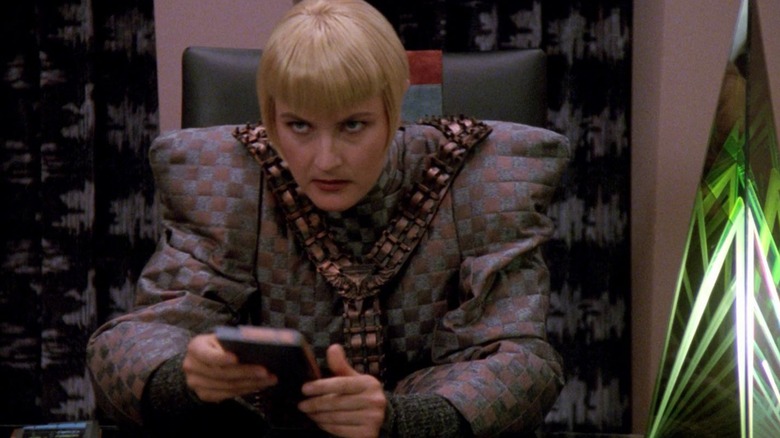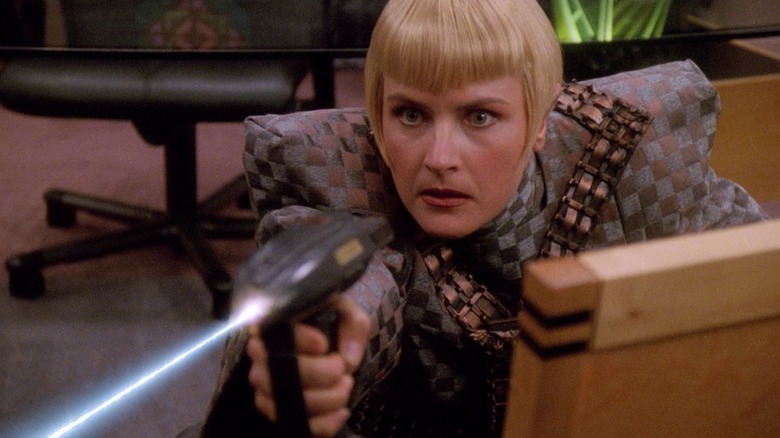The Grossly Misogynistic Comment Denise Crosby Dealt With On Star Trek: TNG
"Star Trek" may take place in a progressive universe, but it was produced in a less ideal world. Franchise Denise Crosby spoke at the STLV convention in Las Vegas, Nevada (covered by TrekMovie), and said that playing her memorable "Star Trek: The Next Generation" villain Sela was a fraught experience. Mostly because some unnamed crew members made sexist, untoward comments about her body.
Sela has a long, soap-opera-like history. In the episode "Yesterday's Enterprise," the Enterprise-C, a ship from 22 years before, accidentally traveled into the future, altering the timeline. The character of Tasha Yar (also Crosby), killed by a monster years before, was still alive in the altered timeline. In this new chronology, the Enterprise-D became a battleship, locked in a decades-long war.
The only way to restore the timeline was to send the Enterprise-C back through a temporal rift, where it's doomed to be destroyed. The crew do the noble thing and travel back to re-instigate the peaceful timeline. Yar, sensing that her resurrection was some kind of cosmic mistake, traveled back in time to help the Enterprise-C.
However, it would later be revealed that Yar was captured in the past, and forced to be a slave for a Romulan commander. Indeed, Yar had a child with that Romulan before being killed. The child, named Sela, grew up among Romulans, and came to look exactly like Denise Crosby. She proved to be a formidable villain in the two-part episode "Unification."
As Sela, Crosby was given a severe haircut, pointed ears, and an outsized Romulan uniform with enormous shoulders. Sadly some jerks noted that her ears wouldn't stand out as much as other parts of her body. Gross.
Denise Crosby encountered sexism on the set of Star Trek: The Next Generation
It's worth remembering that "Star Trek: The Next Generation" creator Gene Roddenberry, while very progressive in many ways, was a notorious horndog. His shows openly advocated for free love, and he was not shy about dressing his actresses in miniskirts or skintight uniforms. Denise Crosby felt that lasciviousness right away when she was cast as Tasha Yar back in 1986. Crosby has been quoted in the past about how the show's producers loved to dress her in high heels and tight, spandex outfits. They also weren't shy about talking about her body in earshot.
It seems that the same lasciviousness hadn't abated when she returned for "Unification" in 1991. Even in a quilted Romulan costume, producers still said overtly sexual things. As Crosby stated:
"I don't want to attribute it to the person that said it, but when I was playing Sela, I have little pointy ears, and they were asked to be looked at, and approved. And the answer was 'Nobody's going to be looking at her ears. They're going to be looking at her t**s.'"
Again, "Star Trek" has — for the most part — long espoused a very progressive viewpoint, but that didn't change that it was originally created by horny straight guys, and that a "bro" mentality continued to pervade production for decades. Women had positions of authority on screen, but behind the scenes, it was still mostly men. Crosby naturally hated that atmosphere, saying:
"Really, it was a men's club, and men were in charge. Very rarely did you see a woman in an authoritative position. Definitely, no women directors, very few, and no women showrunners, no women producers, no women heads of studios. So it still was that misogynistic vibe of 'Honey, just shut up, wiggle your a**, stick out your t**s, wear high heels, look pretty and shut up. You have a job.'"
Yuck.

